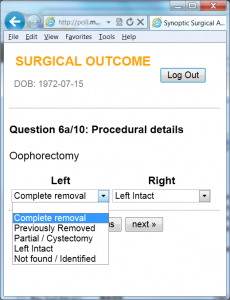A locally-created new smartphone app is enabling ovarian cancer surgeons in B.C. to record details directly from the surgical suite to the provincial database where ovarian cancer tumour information is stored, investigated and tracked.
The app, developed by the Cheryl Brown Ovarian Cancer Outcomes unit, a division of the Ovarian Cancer Research Program (OvCaRe), prompts surgeons to enter specific surgical details, which then populate directly into the Outcomes Unit, saving time and increasing accuracy.
The innovation was made possible thanks to a donation from Doug Gray, whose wife has been treated for ovarian cancer.
Sarah Finlayson, an assistant professor in the Department of Obstetrics and Gynaecology, and a gynaecological surgeon and researcher with OvCaRe (a joint project of the BC Cancer Agency and Vancouver Coastal Health), spearheaded the idea to improve the database of research information, which supports current and future research studies.
“As soon as the case is finished, I can pick up my iPhone and enter all of the vital information from the procedure we just performed,” Dr. Finlayson says. “This takes approximately five minutes to complete versus a lengthy chart review process, which would then need to be manually entered into the system.”
Patient data is secured though a coding that scrambles unique patient identifiers through the data transmission. The end result is critical data that is approved and anonymized is immediately available for leading-edge ovarian cancer research initiatives.
“I was interested in giving to the BC Cancer Foundation to support a sophisticated clinical database project,” said Doug Gray, the donor, whose wife was diagnosed in 2008 and has been in remission for three and a half years after completing surgery and chemotherapy. “I saw this project as an opportunity to augment clinical research knowledge of ovarian cancer that could benefit patients and possibly my wife going forward.”
The new app is a part of a comprehensive enhancement to the Cheryl Brown Ovarian Cancer Outcomes Unit, which will upgrade technology, software and functionality, so that customized patient data can be inputted from the entire health team and extracted and analyzed in “real time” for clinical treatment. This could enhance patient care while providing a superb clinical database for research purposes.
Gaining new understandings about the biology of ovarian cancer and patient responses to treatment hinges on the completeness and accuracy of the data stored in the outcomes unit and gynaecologic cancer tissue bank, which lay the groundwork for breakthroughs in care. To date, this type of data has supported a significant number of research projects, including a landmark study which identified ovarian cancer subtypes.
Gray believes this app and further enhancements will “continue B.C.’s international leadership and positive reputation as leaders in the field of ovarian cancer scientific and clinical research.”
